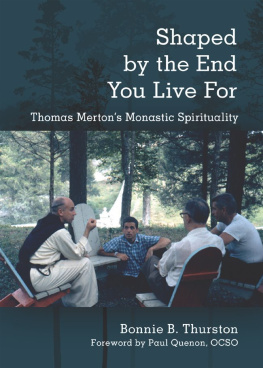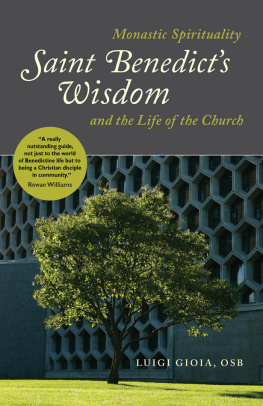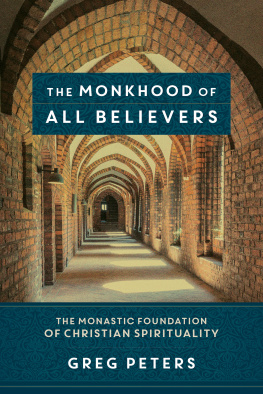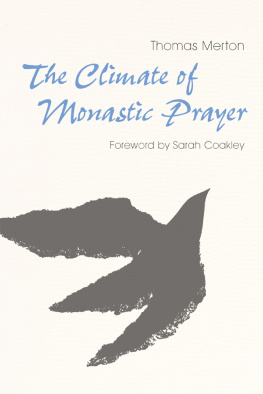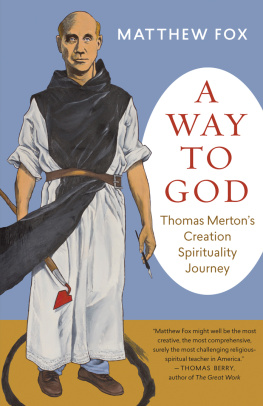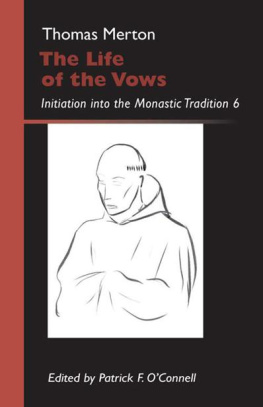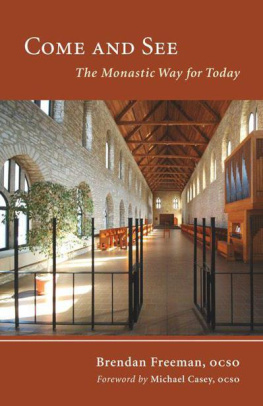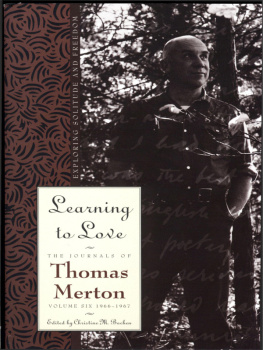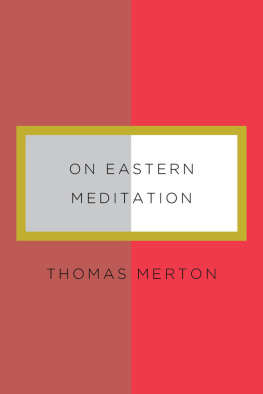This is not just a book about Thomas Merton. It is an invitation to encounter him and delve deeply into the monastic tradition that transformed his life, informed his spirituality, and opened him to the world. Whether they are meeting Merton for the first time or seeking to deepen their understanding of an already familiar friend, readers will enjoy Bonnie Thurstons conversational style and benefit from her singular insights into Merton and his wisdom. This is a book to savor and ponder!
Christine M. Bochen
Professor Emerita of Religious Studies
Nazareth College, Rochester, New York
Co-author of The Thomas Merton Encyclopedia
Thurston argues that to understand Thomas Merton one must understand him as a monk. This careful study argues that point with deep insight based on her four decades of reading and writing about the Merton corpus. This book, extremely readable and unfailingly intelligent, is highly recommended.
Lawrence S. Cunningham, The University of Notre Dame
One of Bonnie Thurstons great gifts to us is her ability to write, when appropriate, about profound topics with a light touchboth accessible and illuminating. That gift is on full display in this wonderful distillation not only of Thomas Mertons core spiritual teachings but of her many years of study, reflection, and prayer on these teachings. She shows clearly and persuasively how Mertons monastic vocation and vision do not separate him from those outside the cloister, but are the ground for his compassionate, insightful identification with the hopes and needs of people in all walks of life, continuing to resonate and inspire in our day as it did in his.
Patrick OConnell
Former president of the International Thomas
Merton Society and editor of The Merton Seasonal
Cover design by Monica Bokinskie. Photograph of Thomas Merton. Used with permission of the Merton Legacy Trust and the Thomas Merton Center at Bellarmine University. Illustration courtesy of Getty Images.
Scripture quotations are from New Revised Standard Version Bible 1989 National Council of the Churches of Christ in the United States of America. Used by permission. All rights reserved worldwide.
Excerpts from the English translation of The Roman Missal 2010, International Commission on English in the Liturgy Corporation. All rights reserved.
2020 by Bonnie B. Thurston
Published by Liturgical Press, Collegeville, Minnesota. All rights reserved. No part of this book may be used or reproduced in any manner whatsoever, except brief quotations in reviews, without written permission of Liturgical Press, Saint Johns Abbey, PO Box 7500, Collegeville, MN 56321-7500. Printed in the United States of America.
Library of Congress Cataloging-in-Publication Data
Names: Thurston, Bonnie Bowman, author.
Title: Shaped by the end you live for : Thomas Mertons monastic spirituality / Bonnie Thurston.
Description: Collegeville, Minnesota : Liturgical Press, 2020. | Includes bibliographical references. | Summary: A survey of Thomas Mertons thought on fundamental aspects of monastic formation and spirituality, which also addresses some of the temptations and popular misunderstandings surrounding monastic lifeProvided by publisher.
Identifiers: LCCN 2019040245 (print) | LCCN 2019040246 (ebook) | ISBN 9780814688076 (paperback) | ISBN 9780814688328 (epub) | ISBN 9780814688328 (mobi) | ISBN 9780814688328 (pdf)
Subjects: LCSH: Merton, Thomas, 19151968. | Monastic and religious life.
Classification: LCC BX4705.M542 T58 2020 (print) | LCC BX4705.M542 (ebook) | DDC 255dc23
LC record available at https://lccn.loc.gov/2019040245
LC ebook record available at https://lccn.loc.gov/2019040246
In grateful memory:
Sr. Mary David DeFeo, OCSO
and
Br. Patrick Hart, OCSO
They first were holy and we may truly call them so.
The Rule of St. Benedict 4.62.
Foreword
There are so many aspects to Bonnie Thurston that the author of this study, like Thomas Merton, is hard to fit into one category. Of all the encounters I have had with her over many years, I retain an image of one moment that seems to sum up her profile. It was at one of the Thomas Merton international conferences where I was seated high enough to see the floor of the stage. After her introduction, in strides Bonnie Thurston, fully confident in the midst of academics, experts, scholars from across the country, and every kind of Merton reader. She wore a plain blouse, skirt, gardening shoes, and light gray socks. That said it all. Here was a woman who cultivates a solitary life, tills a garden at her hermitage back in my home state of West Virginia. Of course, she wore no religious habit, but the plain outfit and practical shoes spoke of monastic simplicity. Her tone was as one attending to business, and her content reached to the depths.
This book achieves those qualities both explicitly and implicitly, in the sense that she knows of what she speaks and speaks by experience. Bonnie is precise, nuanced, and profound, yet writes simply and directly. She meets the highest standards of scholarship and has published widely and often in New Testament studies. In her scholarly work, her personal life remains out of sight, but nevertheless it informs her spiritual understanding. As a thinker she can be one tough-minded West Virginia gal and I remember her taking down the chair of theology from a Catholic university after his lecture, offering him nine points of criticism. His brief and humble response was he agreed with every point. I am glad it did not break out into a squabble because the audience was held in the abbey church here at Gethsemani.
While being a lecturer and author or editor of twenty-two theological books, she is also a poet. I once gave her an argument that her poetry reflects too much of the pedagogue in her. She said that is because she is a pedagogue. Since then I have seen nothing of the likes in her poetry. Her poetic sequence on ancient Irish sites and churches are so sensitive you can feel you are there, even though youve never been.
She has put it in her own words: Writing is my authentic prayer, an attempt to articulate the glimpsed
In those poetic works more of the profile and history of her personal life emerges, and how it informs her writing. I am not a monastic, and have no vocation to cenobitic life, knowing only too well the nightmare I would be to a novice mistress and my sisters. But for nearly thirty years of widowhood, I have experimented with living more or less as a solitary in the old Celtic mode. Without formal vows, I try in a quiet way to conduct my ordinary life monastically.
This small volume is focused on the core of Mertons writing, in terms of themes readers are familiar withsilence, prayer, Gods call, renunciation, contemplation. This is a deftly written handbook on the salient points of monastic spirituality fundamental to Mertons writing. By all evidence it is a synopsis of a wide and continuous reading on Merton that began with Bonnies doctoral dissertation. But in a less obvious way it also springs from a life of solitude lived in the old Celtic mode.
I am thoroughly familiar with Mertons themes and writings, beginning with my days with him in the novitiate, but nevertheless I find in reading through these pages a lucidity and balance, an engaging counterpoint of themes that does justice to Mertons multifaceted thought yet retains basic simplicity. It is an excellent work for beginners as well as for seasoned readers, helping to refresh the air and regain orientation. Merton had such broad interests and was such a pioneer on many frontiers, you can easily lose the central motifs that were driving his expansive energy. Namely, the search for God in monastic life, the love of the place and the brethren, all of which grew and spread beyond the enclosure walls. It is in the deep roots of this solitude and silence that we find one another, whether friend or stranger, whether Christian or of another faith and practice altogetheror of a faith that cannot name itself.

